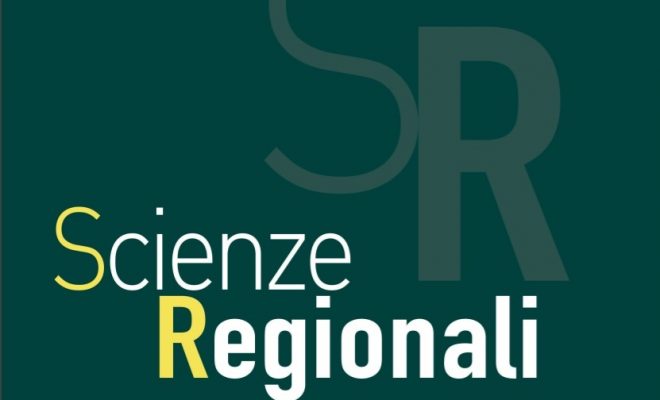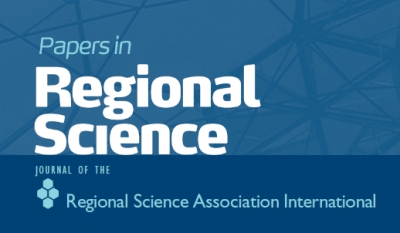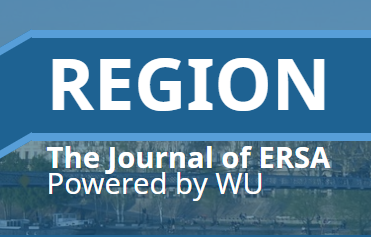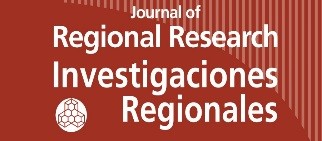This section’s aim is to display ongoing Calls for Submission for Special Issues in Journals relevant to the Regional Science Community.
Ongoing Calls
________________________________________________________________________________________________________________






________________________________________________________________________________________________________________
Posted on 16 May 2025
Call for Papers for Special Issue in Regional Science Policy & Practice (RSPP)
Title: “Impacts of War in Ukraine: Perspectives and Challenges”
Guest Editor: Dr Kateryna Zabarina – University of Warsaw; kzabarina@wne.uw.edu.pl
This special issue aims to collect articles on perspectives and challenges coming from ongoing war. Unlike the previous RSPP Special Issue “Ukraine: geopolitical realities and regional development perspectives” dedicated to understanding a way Ukraine went starting in 1991 without focusing on full-scale war, this issue will address the economic, social, environmental, psychological and geopolitical impacts, providing a platform for in-depth analysis and discussion. By featuring diverse perspectives and rigorous analyses, it aims to foster a deeper understanding of the multifacetedness of the war phenomena and provide a foundation for building more resilient and peaceful futures.
Special issue information:
The war in Ukraine has led to various consequences, reshaping all aspects of everyday life. This special issue aims to explore these changes, bringing together diverse disciplinary perspectives to deepen our understanding of the conflict’s far-reaching effects. Contributions will address themes such as displacement and resilience, economic disruptions, social transformations, ecological damage, and shifts in international relations, with a particular attention to spatial dimension.
By examining these aspects, this issue seeks not only to provide critical analyses but also to offer valuable guidance for policymakers, academics, and practitioners in crafting strategies for rebuilding, reconciliation, and future conflict prevention.
Keywords: Impact of war, challenges and perspectives, multidisciplinary perspective.
Manuscript submission information:
We kindly invite contributions on topics related (but not limited) to:
- Challenges and perspectives for various industries
- Social and Cultural aspects (i.e. education, migration, culture etc.)
- Effects of war on environment
- Geopolitical implications
- Psychological issues
- Policy evaluation (i.e. challenges and possibilities of joining the EU)
All manuscripts will be submitted via the Regional Science Policy & Practice online submission system (https://www.editorialmanager.com/rspp/). Authors should indicate in the cover letter that the paper is submitted for consideration for publication in this special issue “Impacts of War in Ukraine: Perspectives and Challenges”, otherwise, your submission will be handled as a regular manuscript.
Submission deadline: December 31st 2025
________________________________________________________________________________________________________________
Posted on 28 February 2025
Journal of Regional and Urban Economics (JRUE-RERU) Call for Papers – Special Issue on Real Estate
The Journal of Regional and Urban Economics (JRUE-RERU) is launching a special issue on real estate and invites contributions in English. As a key infrastructure shaping human activity, real estate intersects with various disciplines, including regional science, management, geography, economics, and urban planning.
Topics of interest include (but are not limited to):
Housing: Apartments, houses, serviced residences, hotels
Offices: Business buildings, skyscrapers, coworking spaces
Retail: Shopping centers, high streets, retail parks
Logistics: Warehouses, data centers, urban logistics
Approaches & Methodologies:
All methodological perspectives welcome (quantitative, qualitative, comparative)
Theoretical and empirical studies accepted
Multi-scale analyses encouraged
Submission Deadline: September 1, 2025
Submission guidelines: Please click on this link.
________________________________________________________________________________________________________________
Posted on 19 November 2024
RSPP Call for Papers Special Issue: Public Finance in Regional Development and Sustainability
Guest editor
Soomi Lee – Department of Public Administration, University of La Verne (USA); slee4@laverne.edu
The Regional Science Policy & Practice (RSPP) is pleased to announce a special issue focused on the intersection of public finance and regional science. This issue seeks contributions that bridge academic studies and practical applications to understand the role of public finance in regional development and sustainability.
Regional science and public finance are two fields that, while addressing related issues, often operate in silos. While both fields contribute to our understanding of economic systems, their separation limits an integrated perspective of how public finance shapes regional outcomes and, conversely, how regional characteristics influence the design and impact of fiscal policies.
In this special issue, we aim to break down these silos.
We welcome papers from various disciplines, including public policy, economics, urban planning, geography, public administration, and environmental science. Submissions should employ sound and replicable methods that generate robust evidence. We encourage collaborative contributions between researchers and practitioners to provide actionable recommendations.
We will welcome the following themes, among others:
- Tax policy and spatial development
- Fiscal decentralization and inter- and intra-regional fiscal and socioeconomic disparities
- Intergovernmental transfers and regional economic resilience in Climate-impacted regions
- Financing green transitions in regions
- Fiscal policies and migration, such as workforce mobility and rural depopulation.
- Infrastructure finance and the role of public-private partnerships to finance large-scale projects
- Inter- and intra-comparative regional fiscal policies and best practices in developed and developing countries
We look forward to your contributions that will help shape the future of public finance and regional development policy.
Manuscript submission information:
All submissions must be original and may not be under review elsewhere. All manuscripts will be submitted via the Regional Science Policy & Practice online submission system (https://www.editorialmanager.com/rspp/). Authors should indicate in the cover letter that the paper is submitted for consideration for publication in this special issue “Public Finance in Regional Development and Sustainability”, otherwise, your submission will be handled as a regular manuscript.
- Submissions open until July 31, 2025.
- Compile a Special Issue with at least seven accepted papers: May 2026.
Note:
As an open access journal with no subscription charges, a fee (Article Publishing Charge, APC) is payable by the author or research funder to cover the costs associated with publication. This ensures your article will be immediately and permanently free to access by everyone. The Article Publishing Charge for this journal is EUR 1596, excluding taxes.
The RSPP editorial team are pleased to cover APCs for a selected number of accepted articles that are unable to secure sufficient funding. Authors can indicate whether they wish to be considered for this waiver at the beginning of the submission process or by emailing rspp@regionalscience.org
All submitted papers should address significant issues pertinent to the theme of this issue and fall within the scope of Regional Science Policy & Practice (RSPP). Criteria for acceptance include originality, contribution and scientific merit. All manuscripts must be written in English with high scientific writing standards. Acceptance for publication will be based on referees’ and editors’ recommendations, following a detailed peer review process.
Keywords:
public finance, tax policy, public spending, tax competition, fiscal disparity, fiscal equity, fiscal health, fiscal sustainability, infrastructure funding, green bonds
Why publish in this Special Issue?
- Special Issue articles are published together on ScienceDirect, making it incredibly easy for other researchers to discover your work.
- Special content articles are downloaded on ScienceDirect twice as often within the first 24 months than articles published in regular issues.
- Special content articles attract 20% more citations in the first 24 months than articles published in regular issues.
- All articles in this special issue will be reviewed by no fewer than two independent experts to ensure the quality, originality and novelty of the work published.
___________________________________________________________________________________________________________
Posted on 4 October 2024
Scienze Regionali – Italian Journal of Regional Science Call for Special Issue: Regional Perspectives in Economic Complexity: The Role of Scale in Models and Theories
Guest editors
Calogero, Vieri (Università Milano Bicocca)
Napolitano, Lorenzo (JRC Seville)
O’Clery, Neave (CASA, University College London)
Sbardella, Angelica (CREF Roma)
Tacchella, Andrea (CREF Roma)
The development of Economic Complexity (EC) methods has given new impetus to the study of regional capabilities. This Call aims to stimulate insights from a regional perspective regarding the relationship
between EC tools, different types of capabilities, and their respective scales of operation (geographical,
temporal, organizational, cognitive, etc.). Economic complexity provides methods that latently measure
the extent of local productive capabilities through the spatial distribution of economic activities. In recent
years, a vast literature has emerged that applies EC tools to the study of regional systems and, more
recently, to cities (Balland & Rigby 2017; Gao & Zhou 2018; Balland et al. 2020; Di Clemente et al.
2021), and even to amenities (Juhász et al. 2023) and firms (Laudati et al. 2023; Zhang & Rigby 2022).
Economic complexity offers a potentially powerful paradigm to understand key societal issues and
challenges of our time (Balland et al. 2022), such as the green transition (Mealy and Teytelboym, 2022;
Sbardella et al., 2018; Barbieri et al. 2023), development and technological change (Mewes & Broekel
2022), income inequality (Hartmann et al. 2017; Sbardella et al. 2017; Froy et al. 2022), productivity
polarization (Basile & Cicerone 2022), and also fertility changes (Innocenti et al. 2021).
The study of economic complexity has accelerated in the last decade thanks to two key contributions.
The first involved the introduction of Relatedness metrics (Hidalgo et al. 2007; Tacchella et al. 2023),
which measure the overall affinity between a specific activity and a place, explain path dependency, and
predict which activities will grow or decline in a place (Neffke et al. 2011). The second contribution was
the development of Complexity and Fitness metrics (Hidalgo & Hausmann 2009; Tacchella et al. 2012).
These metrics use data on the geography of activities to estimate the local availability of capabilities,
their diversity and sophistication, and finally to predict future economic dynamics (Cristelli et al. 2015).
Since its introduction, economic complexity has been applied to various dimensions of economic
activities such as product exports, value-added exports, patents, employment, and research articles
(Hidalgo, 2021; Pugliese et al., 2019). Recent efforts seek to combine multiple dimensions, revealing
complementarities between different measures in exploring economic outcomes (Pugliese et al., 2019;
Patelli et al., 2023; Stojkoski et al., 2023) and interdependencies between geographical and technological
scales in the space of innovation (de Cunzo et al., 2023; Pugliese et al., 2019). Given the effectiveness
of complexity measures at the national level, a natural extension is to apply them to the regional and
metropolitan levels, which are the fundamental units of economic geography and the focal points of the
global economy (Jacobs 1969; Storper 1992) and global networks. In fact, economic geography is
strongly scale-based, as there is no basis for assuming that associations existing at one scale will also
exist at another (Stone 1968). The scale perspective is also necessary to reconcile the process of
diversification with that of specialization (Balland et al., 2022). Both theoretically and empirically, the
literature has not yet reached a consensus on how to operationalize EC indicators at different scales. The
relationship between specialization and diversification at different scales and for different types of
capabilities is still relatively unexplored (with some notable exceptions such as Pugliese et al., 2019;
O’Clery & Kinsella, 2022; Sbardella et al., 2017). Moreover, a growing body of literature, such as
Evolutionary Economic Geography (EEG), is using the principle of relatedness (PoR) (Hidalgo et al.
2018) to open the black box of the mechanisms that facilitate the transmission of knowledge. This
literature empirically investigates, through various indicators (Tacchella et al. 2023, Schetter et al., 2024),
the importance of different forms of relatedness (Farinha et al. 2018; Jara-Figueroa et al. 2018), their
evolution over time (Diodato et al. 2018), the role of agents of structural change (Neffke et al. 2018;
Elekes et al. 2019; Landman et al. 2023), labor markets (Farinha et al. 2019; Neffke and Henning 2013;
Aufiero et al. 2024), and policy implications (Hidalgo 2023; Balland & Boschma 2022, Li & Neffke
2024; Pugliese and Tacchella 2020).
These tools have also been used to build regional development policy frameworks—such as the European
smart specialization strategy or the Green Deal (Balland et al. 2018; Diodato et al 2023; Pugliese and
Tacchella 2021; Sbardella et al. 2022). The debate on the usefulness of the PoR is very lively (Deegan et
al. 2021; Hassink & Gong 2021; Rigby et al. 2022; Li & Neffke 2022). In particular, on the policy front,
there are still open questions on the “normative” interpretation of related diversification and the potential
risks of low-complexity lock-ins when capitalizing only on existing strengths, as opposed to historical
cases of economic success aimed at diversifying and “complexifying” output through targeted industrial
strategies. This is linked to the call for greater attention to path creation and unrelated diversification, as
well as the factors that promote them (MacKinnon et al. 2019; Coniglio et al. 2021; Boschma et al.,
2023). However, it is key to stress that Economic Complexity analysis provides a snapshot of an
economy’s specialization profile and can offer valuable forecasts into future diversification opportunities
that lead to complexity gains. Still, it does not preclude the role of industrial policy in selecting strategic
development directions.
Specifically, we are interested in papers that address and respond to the following questions:
- What is the role of local and regional economic complexity in relation to different economic and
non-economic outcomes? Are there differences compared to the country-level literature? - What is the relationship between the principle of relatedness and spatial scale across different
domains of knowledge? Are there substantial differences in the mechanisms of knowledge
transmission at different spatial or temporal scales? - How can micro-level information, such as occupations, skills (Turco & Maggioni 2022), and
organizational structure, help us better understand groups, synergies, and skill complementarity
within firms? - At which scales do the processes of diversification and specialization occur? This includes, but
is not limited to, spatial, temporal, and cognitive scales (McNerney et al., 2021). - What are the challenges in building sound EC indicators at different geographical scales with
different underlying patterns of specialization/diversification? - Who are the agents of regional structural change, and what factors promote path creation?
- What factors explain economic complexity, and what is their geography?
- What are the economic mechanisms linking complexity, inequality, and socio-economic
sustainability? - What are the intersections between EC tools and various literatures such as the regional
capabilities framework (and EEG) (Frenken et al., 2023; Kogler et al., 2023), the resource-based
view (RBV) of the firm (Lawson, 1999; Neffke, 2018), the territorial capital approach (Camagni
and Capello, 2012), industrial clusters (Delgado et al., 2014, 2016; Becattini et al., 2014), urban
economics (Ellison & Glaeser, 1997, 1999), Evolutionary economics (Dosi & Nelson 1994) and
complex adaptive systems (CAS) (Batty, 2009; Martin & Sunley, 2007)? - What are the major policy implications from a regional perspective? How do these connect to the
strategies of related and unrelated diversification?
Deadlines:
1.Call for papers: September 2024
2.Deadline submission: June 10 2025 (working paper) max 6.000 words
3.Selection: March 2025
4.Submission full paper: July 2025
5.Publication of the special Issue: 2026
________________________________________________________________________________________________________________
